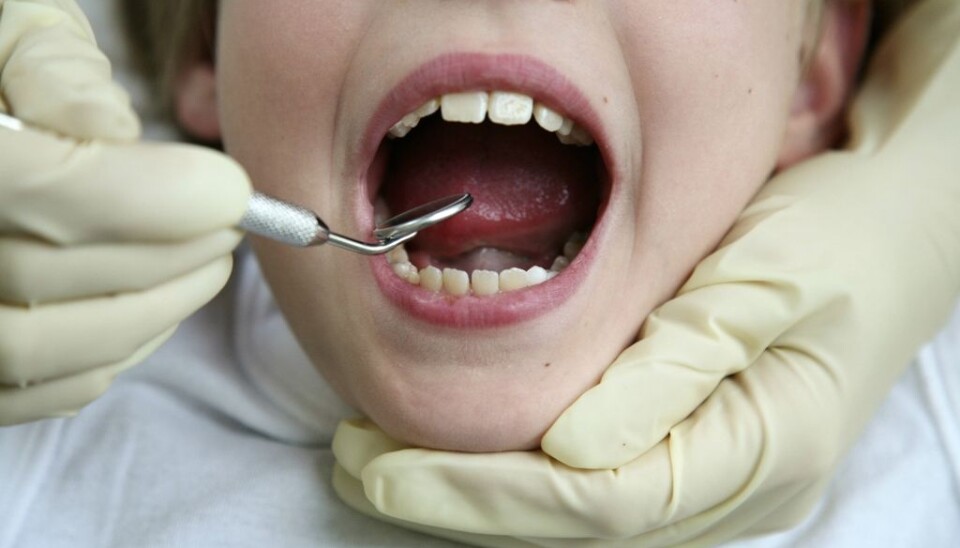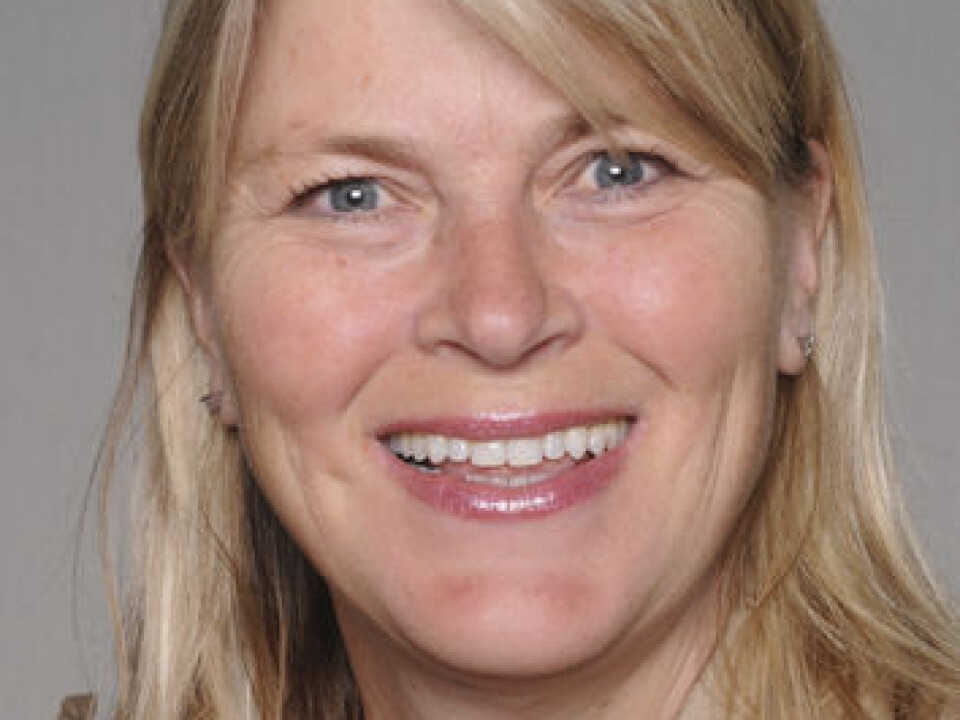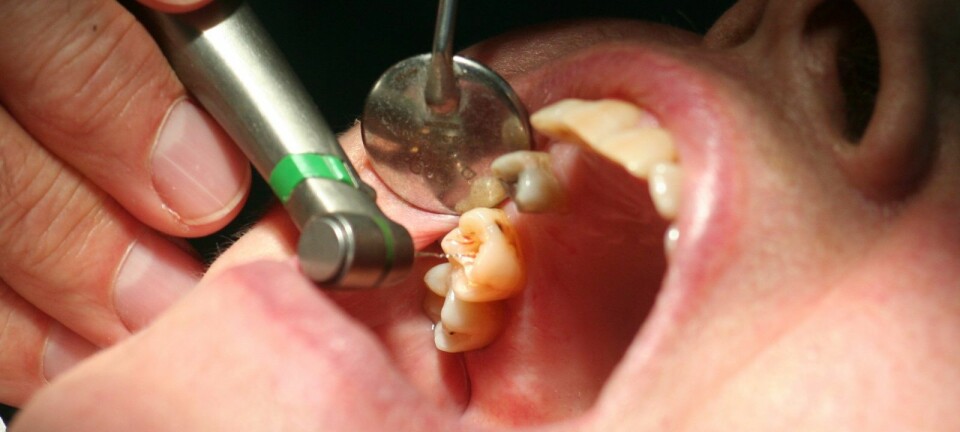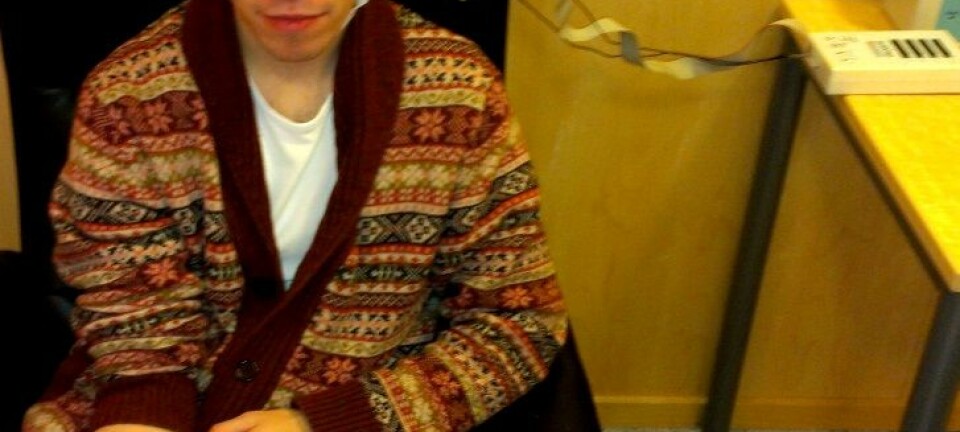
Why do we dread the dentist?
One in five people is afraid of going to the dentist. But if you count yourself among the fearful, don't worry: one researcher says your fears are natural -- and she offers advice to help you conquer them.
Denne artikkelen er over ti år gammel og kan inneholde utdatert informasjon.
What makes some of us afraid to have a relative stranger poke around in our mouths, and worse yet, wield noisy instruments that drill holes in our teeth?
It turns out that both biology and environment have something to do with this not-so-strange - or unusual - fear. For example, if one of your parents is afraid of the dentist, the chances increase that you will share their fear.
One in five
“People can range from no fear at all to a prohibitive phobic condition. We estimate nearly 20 percent of the Norwegian population has some degree of moderate fear,” says Tiril Willumsen.
Willumsen is a dentist and a professor at the University of Oslo’s Section for Paediatric Dentistry and Behavioural Science.
She says if the fear is strong to affect your everyday life, it is considered a phobia – in this case, odontophobia, from the Greek word for tooth, odont.

Willumsen estimates that five percent of Norwegians have odontophobia, while about three percent are so strongly affected they totally avoid going to the dentist.
The more the fear, the worse the teeth
People who are deeply afraid of going to the dentist may find that it affects their quality of life, because they spend a lot of time dreading going to the dentist, Willumsen says. While some may go to the dentist now and again, they may have a terrible time of it. Others simply never go, she says.
Not surprisingly, Professor Willumsen can cite research results that show that people who fear dentists often have worse dental health than those who don’t.
You might think that people who dread the drill would take particularly good care of their teeth, so they would never have to visit the dentist, but people with phobias don't necessarily follow this logic. In fact, Willumsen says, the reason people fear the dentist also affects how they care for their teeth.
“If their phobia is extremely strong they might find it uncomfortable doing anything with their teeth all. Even brushing them can be too unpleasant,” she says. "And people who have toothaches from cavities can find it traumatic to brush their teeth.” .
But what actually makes so many people fear the dentist?
Free air passages
Willumsen says it's common for people to blame their fears on early experiences with the school dentist. "But it is not that simple,” she says.
Instead, there are biological reasons for why we want to keep dentists out of our mouths.
Our mouth is a vulnerable part of our body and several basic needs are threatened via the mouth, including having open air passages.
“We have deep biological survival mechanisms. Fear and avoidance are also naturally triggered when we experience pain,” says the researcher.
People who are prone to suffer odontophobia are often control freaks.
Feeling helpless
Willumsen says that people who have an excessive need to maintain control feel very helpless when they are a dental patient.
Reclining in a dental chair can be hard enough because a prone patient is more helpless.
Some people have suffered traumatic experiences, which intensify these feelings. In particular, people who have been subjected to abuse or torture will often be left with a much greater need to feel in control.
Our experiences in the dental chair can also intensify or diminish a prospective fear of dentists.
“Bad experiences can make the 20 percent even more scared,” she says.
While numerous factors affect this fear, its roots, like so much else in our personalities, could stem from our childhood.
Frightened parents beget frightened kids
As humans, we are social animals who learn from people around us.
“If you see that your parents are frightened, you may learn to take up their fears. Scared parents who take their children to the dentist can easily influence their kids to adopt their qualms.”
“If kids encounter pain or have other experiences that they find scary, the fear could take hold,” Willumsen says.
Thus, the very first visits to the dentist can be the most important.
“We know that if children have lots of good experiences before encountering something negative at the dentist’s, they have a better chance of avoiding this fear,” the researcher says.
A person’s general mental condition will also affect their feelings about visiting the dentist.
Anxiety and fear of shots
Willumsen says that fear of going to the dentist can be due in part to more general anxiety or depression.
“If, for instance, you are suspicious or paranoid you will also be sceptical about dentists,” she says.
Among the many reasons people procrastinate about going to the dentist is a fear of syringes.
Earlier studies have shown that 3.3 percent of adolescents in Norway refrain from going to a dentist if the treatment requires a shot of anaesthetic.
But the fear of dentists isn’t always relegated to dental offices.
Willumsen says that the sound of drills or pictures of a dental office can trigger the fears of people with odontophobia.
“Typically, if journalists are reporting on fear of dentists, they include drilling sounds or pictures in the article. But these can frighten off the target group and they simply won’t read it,” says the researcher.
Ask your friends
Some dentists advertise that they specialise in treating people with dental fear.
Willumsen says this is no guarantee they actually are good with these kinds of patients.
A dentist needs no special education or courses to claim to be a odontophobia specialist.
“There are a few dentists who use laughing gas and they need special authorisation for that, but otherwise there is no specialist training.”
So how do you find the dentists who are skilled in treating frightened patients?
“I’d say the best advice is to ask someone you know, someone with first-hand experience,” says Willumsen.
Handling your fear
Once you have selected a dentist, consider the following advice:
- Be honest and talk to someone about your fear.
- Tell the dentist you are afraid and ask for an appointment to discuss the matter first. This enables the dentist to learn what is needed to make your treatment better.
- You may find it advantageous to find a way to get more control over the treatment situation.
- If you feel that having the dental chair tilted back horizontally is very uncomfortable and frightening, ask if you can sit in a more upright position.
- Take someone you trust with you, who can make sure you keep your appointment, supports you and does not share your fears.
- Ask for an anaesthetic so that you don’t feel a thing; ask for more if you begin to sense pain.
- Most importantly, find a dentist you trust.
——————————————-
Read the Norwegian version of this article at forskning.no
—————
Translated by: Glenn Ostling
































